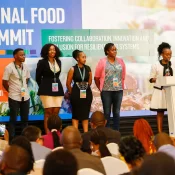
Redefining the Goals of Kajiado Climate Smart Agriculture Multistakeholder Platform
The Africa Centre for Sustainable and Inclusive Development (Africa CSID) actively engaged in a pivotal gathering of the Kajiado County Climate Smart Agriculture Multi-Stakeholder Platform (CSA MSP). As its name implies, the CSA MSP serves as a forum comprising a diverse array of stakeholders, including representatives from the Government, Civil Society Organizations (CSOs), Academia, Development Partners, and the Private Sector. Hosted by the Ministry of Agriculture and Livestock Development, this platform operates at both national and county levels. The National MSP lends support to County MSPs and is structured around five thematic working groups: Knowledge Sharing, Coordination and Reporting Credibility, Networking and Collaboration, Policy Development and Implementation, and Social Inclusivity. The Kajiado County CSA MSP mirrors the national model in its representation of diverse stakeholders.
The central purpose of the meeting was twofold: to redefine the MSP’s objectives and to enhance the capacity of its members to implement various initiatives for heightened efficacy collaboratively. Among the attendees were officials from the County Government, CSOs, the Private Sector, and Farmer Groups. Mr. Peter Kimwele, leader of the Knowledge Sharing Thematic Working Group at the national level, elucidated the ongoing efforts of the National CSA MSP, offering valuable insights to guide the County MSP’s potential involvement. In addition, the Directors responsible for the Livestock Department (Mr. Erick Ahenda) and Crop Department (Ms. Victoria Kyengo) in Kajiado County presented agricultural interventions outlined in the Kajiado County Integrated Development Plan (CIDP). Mr. Peter Pushat, the Environment Director of Kajiado County Government, enlightened participants about CSA funding opportunities accessible through the Kajiado County Climate Change Fund and the Financing Locally Led Climate Actions (FLLoCA) Project. This strategic information was aimed at aligning stakeholder activities with county objectives to facilitate seamless collaboration.
Ms. Salome Owuonda, Executive Director of Africa CSID, delivered a comprehensive presentation on integrating gender considerations within CSA initiatives and FLLoCA programming. The objective was to capacitate stakeholders in integrating gender perspectives and motivating them to account for gender-specific needs and interests across their undertakings and projects. This approach stems from the understanding that climate impacts are not gender-neutral, and gender dynamics profoundly influence agriculture, affecting individuals’ differential access to and control over resources essential for food production, distribution, and consumption.
The workshop concluded with stakeholders exchanging insights and exploring possibilities for collaboration, spotlighting their respective organizational profiles, redefining the County MSP’s objectives and specialized working groups, and outlining the subsequent steps for the MSP. The forthcoming Kajiado CSA MSP meeting is set to receive support from Arid Lands Information Network (ALIN), International Consortium on Climate Biodiversity (ICCB), and Africa Centre for Sustainable and Inclusive Development (Africa CSID).



